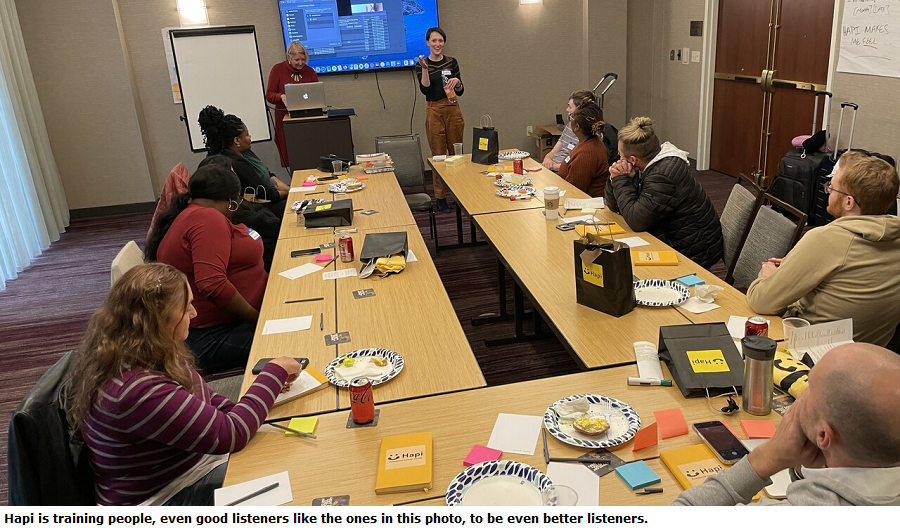Listen Up. Better Listening Really Does Improve Your Bottom Line
Today’s employees expect more out of the workplace experience than ever before. One of their greatest expectations is to be heard. Clearly, the days of “It’s my way or the highway” are over.
As the CEO of Hapi, where we believe leaders can become better listeners, I’ve run into my fair share of skepticism from businesspeople who ask, “What’s the benefit of training managers to become better listeners?” The answer is pretty simple — employees who feel like their concerns are being heard are more productive, making your business more profitable. Happier employees are also less likely to spend most of their free time brushing up on their resumes.
That’s why, in addition to offering people the ability to talk anonymously over the phone via the Hapi app with someone trained in active listening, we now are glad to train CEOs, managers and others who want to become more effective “active listeners” through the launch of the Atlantic Listening Academy.
The key to active listening is to develop Emotional Intelligence, or EQ, skills. One’s EQ is four times more effective at predicting success at a company than one’s Intellectual Quotient or IQ. Recently a Dallas, Texas, corporation found that its employees with high EQ scores were 20 times more productive than their counterparts with low EQ. Further evidence that developing EQ pays off can be found in 72 Connecticut schools – using curriculum developed by the Yale School of Emotional Intelligence has raised test scores 10 percent.
The Atlantic Listening Academy provides EQ training that teaches leaders how to create an environment where team members feel safe to share their hopes and fears. This is done by creating conversations where we don’t just wait for our turn to talk, but listen to truly understand. This deep empathy helps others arrive at their own conclusions and ultimately feel more connected to their work environment. Our overall mission is to build belongingness.
According to the ongoing work of Professor Avi Kluger of The Hebrew University of Jerusalem, studies examining the effects of listening in business overwhelmingly show that people who perceive their boss as being a good listener ascribe to that person leadership ability.
Distractions interrupt the listening process and lead to misunderstandings.
This ability to listen carries over to many of aspects of life. “I found that listening is related to the quality of relationship in any domain of life,” says Professor Kluger, the world's leading expert on listening in the workplace. "People who say the doctor listens to them, they trust the doctor. They trust the salesperson who listens better. They trust their boss.”
An example of how poor listening technique can adversely impact understanding is Professor Kluger’s laboratory experiment where he put flickering screens behind someone speaking to another person. “This little interruption in listening is enough to make your attitude about whatever you talk about — whether it's politics or your fitness to become a manager — more extreme and less complex,” says Professor Kluger. In other words, distractions interrupt the listening process and lead to misunderstandings.
Ask yourself, when you’re talking to your employees is there something flickering in the background? In today’s amped up, high tech infused world, that’s not just a rhetorical question, it’s a real issue. There are many potential distractions — smart phones, tablets, or just the buzz of a busy office — that can make it very easy not to focus on what a person is truly trying to convey.
“The better CEOs ... have contemplated their actions” - Larry Weber
More proof that effective listening pays off comes from leaders at Hapi’s Listening Summit in November in New York City.
Larry Weber is CEO of Racepoint Global, a Boston-based tech public relations and marketing firm and founder of Weber Shandwick. Weber has been pitching his services to CEOs for over 40 years and concludes that his companies won more accounts, as he noted at the Listening Summit, “when we talked less and listened more to what the client’s needs were. I also think that listening leads to contemplation. The better CEOs I've worked with have contemplated their actions,” says Weber.
Continue reading here...


